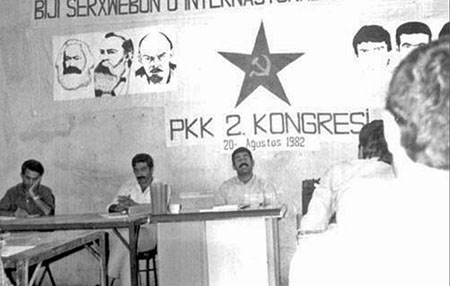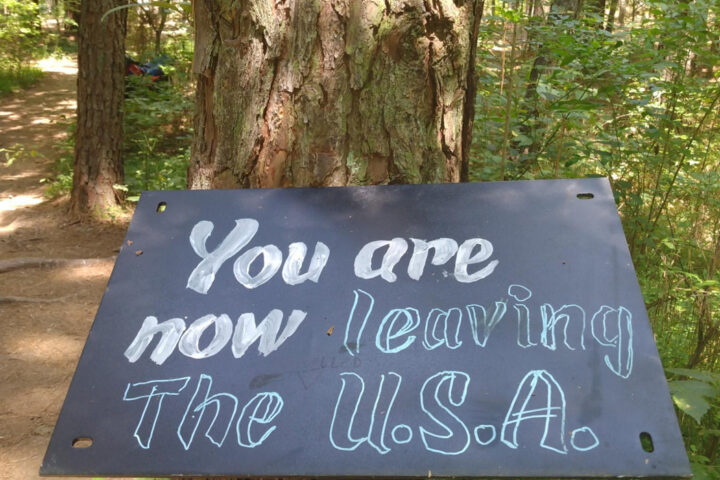reposted from: https://democraticmodernity.com/
If we are to discuss Marx’s significance for the Kurdish liberation struggle, I must first very briefly outline the various phases in the history of the Kurdish liberation struggle. This will focus on the role of Abdullah Ocalan, who, as the foremost theorist and leader of the Kurdish freedom movement, has published eighty-one books (according to a recent count) and who has been in prison for almost twenty years, the last three of them in total isolation without any contact to the outside world.
Brief historical outline
Foundational years (1973-1983)
These foundational years cover the ten years between the formation of the first ideological group around Abdullah Ocalan in 1973 and the start of the armed struggle against the Turkish regime in 1984. During this period, a whole series of theoretical and programmatic texts were produced, all of which are now available online – although often only in Turkish – including the PKK’s founding programme of 1978.
If we look at these texts, which were mostly written after collective discussion lead by Abdullah Öcalan, we find in them the traces of an extensive reading of Marx by the movement’s early protagonists. The party defined itself as a proletarian party, with their analysis of the political situation of the time based on the different interests of the different classes.
Years of struggle
In the years when the guerrilla struggle grew from around 30 militants to up to 30,000, practical problems played a major role. Questions of power and bureaucracy came to the fore as the People’s Liberation Army (ARGK) controlled significant amounts of territory, at least temporarily. At the same time, an examination of the role of religion became more important, since large parts of the population were and are religious, with many different religious groups present in the region.
One of the most amazing achievements of the Kurdish freedom movement was becoming a mass movement as a non-religious movement in a religious society. Key to this achievement was the movement’s accurate understanding of the different faiths and its renunciation of direct confrontation with religion. Religion is viewed dialectically in its various functions: On the one hand, it provides community, offers people moral guidelines and a narrative about the past and the future. On the other hand, religion becomes a plaything for the interests of the rulering class and serves to set communities against each other – even to the point of genocide. This understanding makes it possible, for different communities to cooperate and avoid conflict, wherever the movement is influential.
New paradigm (1999 – present)
After the abduction of Abdullah Ocalan from Nairobi in 1999 and the subsequent ceasefire that lasted for about five years, the movement underwent a comprehensive reassessment of its theoretical foundations. In this process, the prison writings of Öcalan played a decisive role, in which he processed both his own political-practical experience and the reading of Marxist authors and others from Hegel to Murray Bookchin. The reorientation of the movement on this basis forms the background for the revolution in Rojava/Northern Syria, but also for the politics of the HDP (Peoples’ Democratic Party) in Turkey.
The significance of Marx
So what has Marx’s significance for the movement been over the years? I would like to present a series of theoretical and practical reference points that illustrate how the Kurdish freedom movement essentially follows Marx’s philosophy and method – and where it does not.
The beginning is an episode from the time of the 1968 movement in Turkey. Öcalan, who had been quite religious in his youth, acquired a copy of Leo Huberman’s “The ABC of Socialism”, a popular introduction to Marxism. He devoured it and concluded, “Mohammed lost, Marx won.”
The Turkish translations of Marx’s works at that time enjoy a dubious reputation and were later widely criticised and revised. Moreover, the new movement was not primarily interested in economic details, but in the theory and practice of the liberation struggles inspired by Marx and Lenin in Cuba, Angola and above all Vietnam. And yet, some core elements of Karl Marx’s philosophy have been the ideological centrepieces of the Kurdish liberation movement for forty-five years. Many of them have become so ingrained in the movement that they are no longer perceived as coming from Marx.
History
First of all, there is the philosophy of history. All conditions are made by people and can be changed by people. In addition, there is the confidence that history is moving towards socialism with a certain inevitability, although it still needs the intervention of conscious revolutionaries. While such determinism has been criticised extensively within the movement recently, the consciousness of being on the right side of history has been quite helpful for confronting, simultaneously or successively, the NATO state of Turkey and its torturers, the Arab despots in Syria and Iraq, and the theocracy of the mullahs in Iran.
Beyond that, however, Öcalan proves to be a student of the method that Engels demonstrates in “The Origin of the Family, Private Property and the State”. Using the latest findings from scientific research, he attempts to uncover and criticise the historicity of the foundations of today’s society. Like Engels, he is concerned with the origin of the state, but he deals in detail with the very first states, the Sumerian city-states such as Uruk and Nippur, of whose existence Marx and Engels could not yet have known. The result is a fascinating analysis of the theological foundations of state thinking from Sumerian mythology to the secular religion of nationalism.
The greatest attention, however, is paid to the non-state structures that existed before the states, to which the state forms the antithesis. Öcalan devotes great attention to these structures and their continued existence in oppositional religious and philosophical movements. Slowly, he has moved away from Marx’s postulate that all history is the history of class struggles. Today, the movement understands history as the history of conflicts between state, urban and patriarchal civilisation on one hand and the communal resistances to it on the other. These can be led by women, or by heterodox religious groups, by oppressed peoples and ethnic groups, or by communities with oppositional philosophies including scientific socialism.
In many ways, I argue, Öcalan is doing for the Middle East what Marx and Engels did for Western history: writing history from the point of view of the oppressed, with the aim of liberation, using the methods of historical materialism.
This brings us to the second point: dialectical thinking.
Dialectics
Like Marx, Öcalan thinks of everything in terms of relations, in terms of movement, in terms of contradictions. The whole history of civilisation, which he examines in many volumes, therefore has an antithesis, precisely the women, peoples and heterodox faith communities and movements oppressed by state civilisation.
One of the methods of the movements’ political work is to have people from different socio-cultural backgrounds work together, for example, a petty-bourgeois student from Istanbul with an illiterate shepherd from a mountainous region of Kurdistan. The resulting conflicts are then analysed and discussed and serve as educational material for the whole movement. In this way, contradictions are made productively useful.
Internationalism
In the best tradition of Marx, the PKK thinks of liberation in the Middle East as a liberation of all those who are oppressed in the region, not just the Kurds.
The Kurdish freedom movement was conceived from the outset as an internationalist one. The first core group of three in the movement consisted of two Turks and one Kurd. The liberation of Kurdistan was conceived in the 1970s in the context of a socialist revolution in the Middle East. The training of the first guerrilla fighters took place in the camps of the Palestinian PFLP (Popular Front for the Liberation of Palestine).
Kurdish nationalism, which mostly took the form of collaboration with state powers, was criticised and opposed from the beginning. This background is important to know nowadays, when not only the bourgeois press rants about a “Kurdish state” in Northern Syria. On a recent trip through Northern Syria, I saw the huge cemetery of Kobanê, where most of the volunteers who inflicted the Islamic State’s most important defeat are buried. More Kurdish volunteers, however, have fallen in the liberation of the so-called “Arab” towns, where Syrian democratic forces are building a multi-ethnic and multi-religious council system.
Women’s Liberation
In its emphasis on women’s liberation, the movement goes far beyond Marx and almost all other revolutionary movements. Although Marx also provided the basis for the analysis of reproduction with his theory of surplus value, he is essentially concerned with production. Based on the analysis of the gender question as the essential social contradiction in the Middle East, Öcalan, on the other hand, interprets the relationship between “reproduction” and “production” the other way round: the economy of providing food and clothing and raising children, which is essentially carried by women, is the real, use-value-oriented economy, while the “economy”, which is sometimes exchange-value-oriented and sometimes based on violent plundering, is a development of men. Öcalan finds evidence of the transition from a matriarchal economy to patriarchal relations of violence in the Sumerian city states, which lasted several centuries – if not millennia – in ancient Mesopotamian texts.
The attitude towards women’s liberation finds visible expression not only in the large number of autonomously organised women fighters in the guerrilla and self-defence structures in Northern Syria, but also in the mixed-gender dual leadership of all bodies at all levels of political work, including a right of veto for the women’s structures.
“Philosophy of practice”
Perhaps the most important point, however, where the movement is inspired by Marx, and which already resonates in its description as a “struggling movement”, is the conception of Marxian thought as a “philosophy of practice”. The movement’s theoretical debates are not for the sake of being opinionated or filling magazine pages, but for gaining knowledge for political practice. Practice, in turn, is the starting point for the further development of theory. This has happened in the Kurdish movement to such an extent that it can credit itself with having added more than a few footnotes to the corpus of socialist literature.
Thus, the movement is constantly developing new methods to dismantle existing power relations and replace them with egalitarian structures.
Conclusion
With its creative interpretation of Marx and a constant, lively debate on many questions of socialist theory and practice, the Kurdish freedom movement is perhaps the most important revolutionary movement in the tradition of Karl Marx today. The fact that many Marxists know little about this is a sad state of affairs that we are actively working to remedy.
The revolution in Northern Syria is threatened, not only by Turkey and its Islamist mercenary forces. NATO is also fighting the movement fiercely. Öcalan, on whose ideas the revolution in Northern Syria is essentially based, has been completely isolated from the outside world in Turkey for three years; he has had no contact with his lawyers for almost seven years. The protest against these conditions in this country – except among Kurds – is unfortunately very modest. I call on everyone to learn more about the revolution and the movement that supports it, and to show solidarity with it on the ground.




